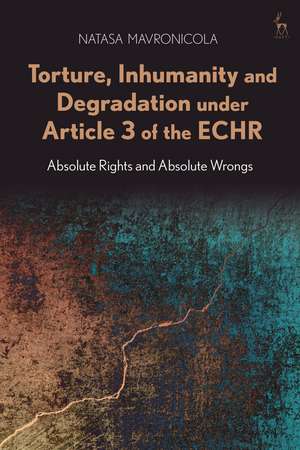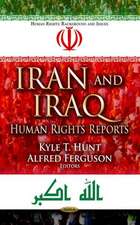Torture, Inhumanity and Degradation under Article 3 of the ECHR: Absolute Rights and Absolute Wrongs
Autor Dr Natasa Mavronicolaen Limba Engleză Paperback – 19 oct 2022
| Toate formatele și edițiile | Preț | Express |
|---|---|---|
| Paperback (1) | 256.49 lei 6-8 săpt. | +91.44 lei 6-10 zile |
| Bloomsbury Publishing – 19 oct 2022 | 256.49 lei 6-8 săpt. | +91.44 lei 6-10 zile |
| Hardback (1) | 539.32 lei 6-8 săpt. | |
| Bloomsbury Publishing – 24 feb 2021 | 539.32 lei 6-8 săpt. |
Preț: 256.49 lei
Preț vechi: 330.66 lei
-22% Nou
Puncte Express: 385
Preț estimativ în valută:
49.08€ • 50.63$ • 40.96£
49.08€ • 50.63$ • 40.96£
Carte tipărită la comandă
Livrare economică 26 martie-09 aprilie
Livrare express 18-22 februarie pentru 101.43 lei
Preluare comenzi: 021 569.72.76
Specificații
ISBN-13: 9781509942428
ISBN-10: 1509942424
Pagini: 224
Dimensiuni: 156 x 234 x 16 mm
Greutate: 0.31 kg
Editura: Bloomsbury Publishing
Colecția Hart Publishing
Locul publicării:London, United Kingdom
ISBN-10: 1509942424
Pagini: 224
Dimensiuni: 156 x 234 x 16 mm
Greutate: 0.31 kg
Editura: Bloomsbury Publishing
Colecția Hart Publishing
Locul publicării:London, United Kingdom
Caracteristici
The author offers a defence for the continued recognition of the non-displaceable character of article 3 of the ECHR
Notă biografică
Natasa Mavronicola is a Reader in Law and Deputy Head of Research at Birmingham Law School, University of Birmingham, United Kingdom.
Cuprins
1. Introduction 1.1. The Book's Dual Pursuit 1.2. The Approach Taken 1.3. The Book's Structure 2. What Is an 'Absolute Right'? A Conceptual Framework on Applicability and Specification 2.1. Introduction: Interrogating the Concept of an 'Absolute Right' 2.2. The Applicability Parameter: Absolute Rights as Non-displaceable Entitlements 2.3. The Applicability Parameter Affirmed in ECtHR Doctrine 2.4. The Specification Parameter: Significance and Implications 2.5. Conclusion3. Delimiting the Absolute: How Should the ECtHR Approach the Specification of Article 3 ECHR? 3.1. Introduction 3.2. Specifying Article 3 ECHR: The ECtHR's Task 3.3. The Words, and Wrongs, Themselves 3.4. Article 3's Negative and Positive Obligations 3.5. Conclusion4. The Specification of Torture under Article 3 ECHR4.1. Introduction 4.2. Torture as an Aggravated Wrong within Article 3 4.3. Distinguishing Torture: From Intensity of Suffering to Severity of Treatment 4.4. Conclusion5. The Article 3 'Threshold': The Specification of Inhuman or Degrading Treatment or Punishment 5.1. Introduction 5.2. Starting Points in Identifying Inhumanity and Degradation 5.3. The Court's 'Relative' Assessment in Light of the Legitimate Specification Criteria 5.4. 'All the Circumstances of the Case'(?) and Legitimate Specification 5.5. Inhumanity and Degradation in the Context of Punishment 5.6. Conclusion6. The Specification of Positive Obligations under Article 3 ECHR 6.1. Introduction 6.2. What Are Positive Obligations? 6.3. The Circumstances in Which Positive Obligations Arise under Article 3 ECHR6.4. The Substantive Scope of Positive Obligations under Article 36.5. The Specification of Positive Obligations under Article 3 in Light of the Absoluteness Starting Point 6.6. Rethinking Positive Obligations' Coercive Orientation 6.7. Conclusion7. Specifying the Non-Refoulement Duty under Article 3 ECHR 7.1. Introduction 7.2. The Nature of the Central Obligation 7.3. The Non-Refoulement Duty Seen Through the Applicability Parameter 7.4. The Specification of the Non-Refoulement Duty under Article 3 ECHR7.5. Real Risk 7.6. Conclusion8. Conclusion 8.1. What Are (the Implications of) Absolute Rights? 8.2. Context, Justificatory Reasoning and the Legitimate Specification of Article 3 ECHR 8.3. Positive Duties to Protect - And Their Limits 8.4. Between the Certain and the Right 8.5. Defending and Upholding the Right Not to Be Subjected to Torture or Inhuman or Degrading Treatment or Punishment: The Future















